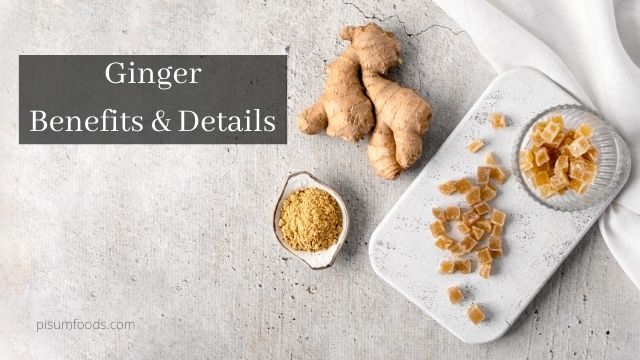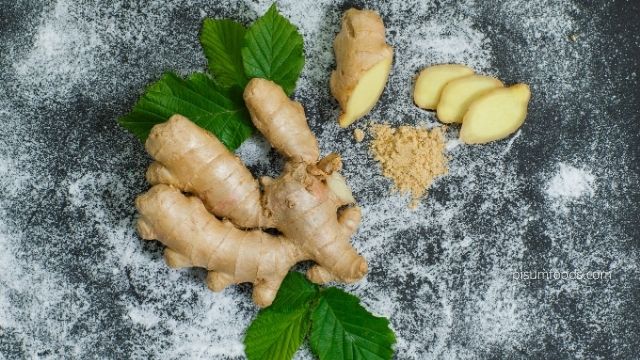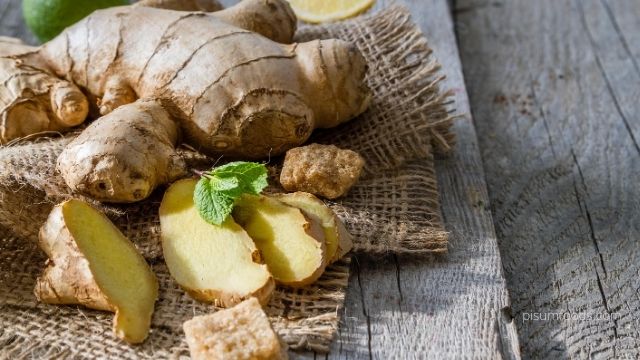 Translate
Translate Translate
TranslateGinger belongs to the Plantae kingdom. The word ginger is derived from an old English word ‘gingifer’. It’s a spice and folk medicine. It originated somewhere in Maritime Southeast Asia. It doesn’t exist in wild form. Now that we know about certain details of ginger, let’s skip to know more about it.
Ginger is crucial for human health. It’s medicinal properties have been mentioned in written records ever since the times of Ayurveda. It’s very good for health in a number of ways. It’s also said to be in the Analects of Confucius. The Chinese people carried ginger in pots when they went on a voyage. Raw and preserved ginger was imported by Europeans in the middle ages. Ginger benefits in a lot of ways. It prevents cancer and treats muscle pain. It’s good for colds and flu and treats severe indigestion. It also prevents nausea. Ginger also improves blood circulation.

Apart from its side effects, ginger also has some side effects. Ginger can cause diarrhea and mild stomach discomfort. Women can have extra menstrual flow if they consume ginger. Let’s get to know ginger in detail.
Ever since the Ayurvedic age, ginger is termed to have medicinal properties. The Health benefits of ginger are because of gingerol, the compound that is chief for antioxidant and anti-inflammatory properties. Ginger for health is recommended only if less than 4 grams per day and it should not be consumed by children less than 2 years of age. Ginger benefits also include their property of getting rid of morning sickness. It’s generally useful for pregnant women but not more than 1 gram per day.
Ginger tea infused with lemon extracts can help with the cold. As ginger is good for cold, it’s also good for the flu. It is good on the throat and can kill the cold and flu causing germs easily.
Ginger can be used for the heart as it helps in lowering blood cholesterol. It reduces blood pressure and makes sure that the liver is also functioning properly.
Ginger helps inflammation in the same way as COX-2 inhibitors. Ginger can cure arthritis and prepare better immunity for the body because of its anti-inflammatory properties.
Ginger for cancer is ten thousand times more powerful than chemotherapy. It’s anti-cancer properties prove to be natural for killing the cancer cells in the body.
Ginger for the brain is proved with a test on 60 women in 2016 where it was proved that ginger helps in better functioning of the brain. It also enhances attention. It affects the brain in all good ways directly.
Ginger for muscle pain is proved to be a boon because of its anti-inflammatory properties which were tested on animals and proved to be a good pain reliever.
Ginger can treat severe indigestion by its phenolic compounds that can cause the acid in the stomach to go back to the esophagus. It also gives relief in gastrointestinal irritations.
Ginger is good for nausea and vomiting as scientists believe that it is good for the stomach, so it keeps food down and good to be able to help with nausea and vomiting.
Ginger is good for the liver as it cleanses it. It helps get rid of build-up toxins and waste and sweating as well. It also helps against liver fibrosis.
Ginger reduces menstrual cramps if it’s drunk in the following manner: add dried ginger powder to boiled water with a pinch of salt and honey. Drink it twice a day to get rid of cramps and pain.
Ginger is good for cholesterol in whatever form it can be taken as, dried, raw, or direct in food. A study made in 2008 and 2014 proves it benefits over cholesterol.
Ginger kills bacteria in whatever form it is consumed in daily diet. It sounds like a false statement but ginger tea or a small amount of ginger in daily food can really do the trick. You can check the difference all by yourself.
Ginger promotes healthy aging and protects the body’s DNA by fighting off diseases like blood pressure. It’s also good for the heart.
Apart from the aforementioned benefits, ginger also has some other uses. A little amount of ginger every day can do wonders for your body. It’s good for the heart, the stomach, and the brains. Let’s have a look at the other benefits of ginger:

Ginger improves blood circulation and prevents aging of the skin. It prevents radical damage and evens skin tone. Ginger powder can be applied to the skin in minor quantities only, or it should be made into a paste with rose water or honey. Ginger can hence benefit the skin in the following ways:
Anti-aging
Glowing Skin
Skin Toning
Reduces White Scars
Ginger helps stimulate hair follicles. It hence helps in growing new hair. One can apply ginger juice in hair and leave it in for half an hour or so and then rinse it off with mild shampoo. Its fatty acid can cause a reduction in the ruining of hair as well. Therefore, ginger for hair is useful as:
Helps in Hair Growth
Prevents Dandruff
Treats Split Ends < br>
Reduces Hair Fall
Some interesting ginger facts varied from their benefits and side effects are mentioned below:
Ginger turns pink when pickled in sweet vinegar, commonly seen in sushi.
Ginger is mentioned in the Bible, Quran, and Talmud.
Ginger also helps in saliva production.
In some cuisines, ginger is eaten in between courses and meals to finish the palate.
Ginger oil is sometimes used as a fragrance or perfume as well.
“Anything in excess is harmful”. The same goes for this spice. Ginger, directly raw, or in dried powder form can cause serious problems and discomforts in the body if not taken in appropriate quantities. Let’s have a look at a few of the side effects of ginger:

Ginger can cause a number of problems if consumed directly by mouth in the wrong quantity like the following:
Diarrhea
Abdominal pain
Heartburn
Depression
Dermatitis.
Ginger shouldn’t be applied to the skin for a long time. Some might experience irritation. In other conditions, it can cause a burning sensation and make the skin red. It’s a hot spice, somewhat like chilies.
Ginger is good for morning sickness. It’s said to be good for nausea and vomiting for pregnant women. But it is also a little risky as it can cause miscarriages if not consumed in the proper quantity.
Ginger is said to release the sugar in muscles naturally, bringing up the insulin intake levels, and hence it is good for diabetes. So if someone is already high with sugar levels, they should avoid taking ginger.
Ginger export from India has seen a very good rise ever since the pandemic, along with the other spices as well. In April 2020, the export of spices went up by 50 %, owing to the natural immunity that the spices provide. The export of Ginger in India from 2018 reached USD 31.5 million. India is the largest producer of ginger, Assam being the largest producer in India.
Ginger exporters from India are a lot. There are so many private and public companies in the market. If I had to choose a nuisance free option, for the export of ginger, I would choose Pisum Food Services. They are the global importers and exporters of a number of food commodities. Their vision is to provide nutrients globally. Ginger imports from India have seen a stable growth as China continues to be the largest exporter.If you're looking to be an exporter, go check their website for more information.